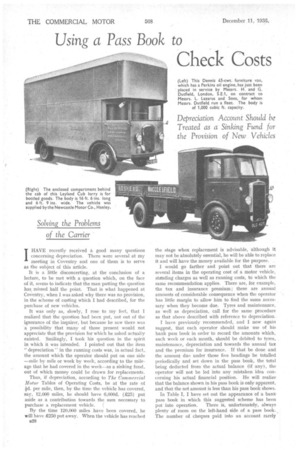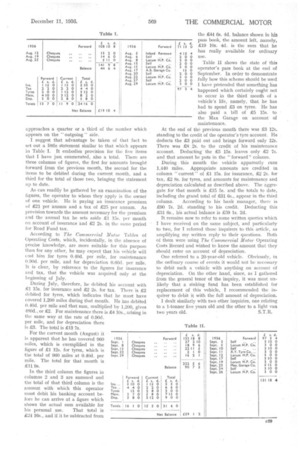Using a Pass Book to
Page 46

Page 47

If you've noticed an error in this article please click here to report it so we can fix it.
Check Costs
IHAVE recently received a good many questions concerning depreciation. There were several at my meeting in Coventry and one of them is to serve as the subject of this article.
It is a little disconcerting, at the conclusion of a lecture, to be met with a question which, on the face of it, seems to indicate that the man putting the question has, missed half the point. That is what happened at Coventry, when I was asked why there was no provision, in the scheme of costing which I had described, for the purchase of new vehicles, It was only as, slowly-, I rose to my feet, that I realized that the question had been put, not out of the ignorance of the inquirer, but because he saw there was a possibility that many of those present would not appreciate that the provision for which he asked actually existed. Smilingly, I took his question in the spirit in which it was intended. I pointed out that the item " depreciation " in the running costs was, in actual fact, the amount which the operator should put on one side —mile by mile or week by week, according to the mile. age that he had covered in the week—as a sinking fund, out of which money could be drawn for replacements.
Thus, if depreciation, according to The Commercial Motor Tables of Operating Costs, be at the rate of id. per mile, then, by the time the vehicle has covered, say, 12,000 mites, he should have 6,000d. (£25) put aside as a contribution towards the sum necessary to
purchase a replacement vehicle. ( By the time 120,000 miles have been covered, he will have £250 put away. When the vehicle has reached the stage when replacement is advisable, although it may not be absolutely essential, he will be able to replace it and will have the money available for the purpose. .
I would go farther and point out that there are several items in the operating cost of a Motor vehicle, standing charges as well as running costs, to which the same recommendation applies. There are, for example, the tax and insurance premium; these are annual amounts of considerable consequence when the operator has little margin to allow him to find the sums necessary when they become due. Tyres and maintenance, as well as depreciation, call for the same procedure as that above described with reference to depreciation.
I have previously recommended, and I now again suggest, that each operator should make use of his bank pass book in order to record the amounts which, each week or each month, should be debited to tyres, . maintenance, depreciation and towards the annual tax and the premium for insurance. If that be done and the amount due under those five headings be totalled periodically and set down in. the pass book, the total being deducted from the actual balance (if any), the operator will not be led •into any mistaken idea concerning his actual financial position. He will realize that the balance shown in his pass book is only apparent, and that the net amount is less than his pass book shows.
In Table I, I have set out the appearance of a bank pass book in which this suggested scheme has been put into operation. There is, unfortunately, always plenty of room on the left-hand side of a pass book. , The number of cheques paid into an account rarely
approaches a quarter or a third of the number which appears on the "outgoing " side.
I suggest that advantage be taken of that fact to set out a little statement similar to that which appears in Table I. It embodies provision for the five items that I have just enumerated, also a total. There are three columns of figures, the first for amounts brought forward from the previous month, the second for the items to be debited during the current month, and a third for the total of those two, bringing the statement up to date.
As can readily be gathered by an examination of the figures, the operator to whom they apply is the owner of one vehicle. He is paying an insurance premium of £21 per annum and a tax of £25 per annum. As provision towards the amount necessary for the premium and the annual tax he sets aside £1 15s. per month on account of insurance and £2 2s. in the same period for Road Fund tax.
According to The Commercial Motor Tables of Operating Costs, which, incidentally, in the absence of precise knowledge, are more suitable for this purpose than for any other, he may expect that his vehicle will cost him for tyres 0.40d. per mile, for maintenance 0.90d. per mile, and for depreciation 0.60d. per mile. It is clear, by reference to the figures for insurance and tax, that the vehicle was acquired only at the beginning of July.
During July, therefore, he debited his account with £1 15s. for insurance and 22 2s. for tax. There is £2 debited for tyres, which indicates that he must have covered 1,200 miles during that month. He has debited 0.40d. per mile and that sum, multiplied by 1,200, gives 480d., or £2. For maintenance there is £4 10s., arising in the same way at the rate of 0.90d. per mile, and for depreciation there is £3. The total is £13 7s.
For the current month (August) it is apparent that he has Covered 960 miles, which is exemplified in the figure of £1. 12s. for tyres, which is the total of 960 miles at 0.40d. per mile. The total for that month is £11 9s.
In the third column the figures in columns 2 and 3 are summed and the total of that third column is the amount with which this operator must debit his banking account before he can arrive at a figure which shows the actual sum available for his personal use. That total is £24 16s., and if it be subtracted from
the £44 Os. 4d. balance shown in his pass book, the amount left, namely, £19 10s. 4d. is the sum that he has really available for ordinary use.
Table II shows the state of this operator's pass book at the end of September. In order to demonstrate fully how this scheme should be used I have pretended that something has happened which certainly ought not to occur in the third month of a vehicle's life, namely, that he has had to spend £3 on tyres. He has also paid a bill of £5 15s. to the Max Garage on account of maintenance.
At the end of the. previous month there was £3 12s. standing to the credit of the operator's-tyre account. He deducts the £3 paid out and brings forward only 12s. There was £8 , 2s. to the credit of his maintenance account. Deducting' the £5 15s leaves only £2 7s. and that amount he puts in the " forward " column.
During this month the vehicle apparently runs 1,440 miles. Appropriate amounts are credited in column " current " of £1 15s. for insurance, £2 2s, for tax, £2 8s. for tyres, and amounts for maintenance and depreciation calculated as described above. The aggregate for that month is £15 5s. and the totals to date, including the grand total of £31 Os., appear in the third column. According to his bank manager, there is £90 7s. 2d. standing to his credit. Deducting this £31 6s., his actual balance is £59 1s. 2d.
It remains now to refer to some written queries which I have received on the same subject, and particularly to two, for I referred those inquirers to this article, as amplifying my written reply to their questions. Roth of them were using The Commercial Motor Operating Costs Record and wished to know the amount that they should enter on account of depreciation.
One referred to a 20-year-old vehicle. Obviously, in the ordinary course of events it would not be necessary to debit such a vehicle with anything on account of depreciation. On the other hand, since, as I gathered from the general tenor of the inquiry, it was most unlikely that a sinking fund has been established for replacement of this vehicle, I recommended the inquirer to debit it with the full amount of depreciation.
I dealt similarly with two other inquiries, one relating to a 1-tonner five years old and the other to a light van two years old. S.T.R.




































































































